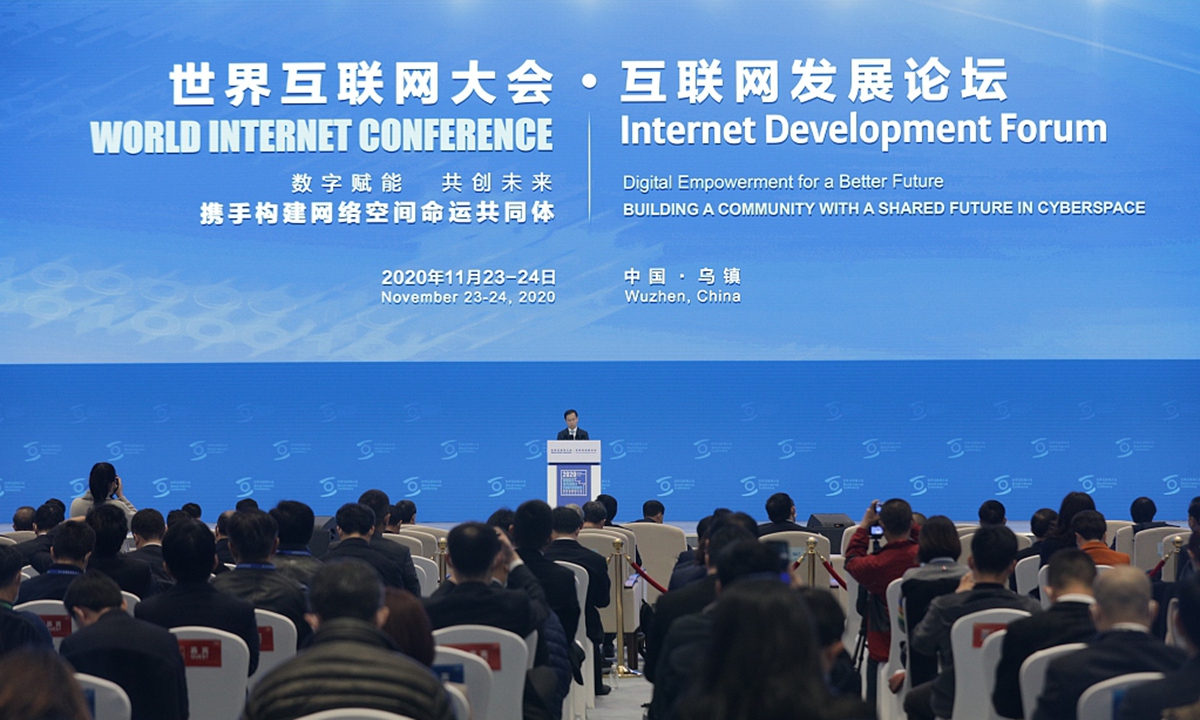
Photo: VCG
Amid intermittent drizzles that add to the beauty of the water town of Wuzhen in East China's Zhejiang Province, where the annual World Internet Conference (WIC) is being held, voices are growing louder that China's digital prowess renders the global economy the only silver lining in a COVID-19 recession.
The high-profile conference where a ringing call to action for digital cooperation was reiterated is yet another significant elaboration of China's far-ranging digital ambitions that have been outlined by Chinese leadership in the course of three heavyweight multilateral meetings over the past week - a virtual summit of the BRICS, the 2020 APEC Economic Leaders' Meeting and the virtual G20 summit. The Chinese solution to the world's immense economic plight was crystallized at the three crucial meetings - namely its digital economic leadership.
With digital technologies playing a significant part in fighting the pandemic, restoring the economy from the virus assault and cutting poverty, the rest of the world holds high hopes that China will not only continue to power ahead, but also blaze a trail for multilateralism and global collaboration in the digital era, according to key messages from the two-day internet gathering that opened Monday.

Photo: VCG
What's especially energizing is a balance being sought between innovation and regulatory governance in China, which an internet veteran reckons would start a new era of data sovereignty - the next big thing in reforming the economy.
In today's world, a new round of scientific and technological revolution and industrial transformation is thriving, driving the rapid development of digital technology, Chinese President Xi Jinping said in a congratulatory letter he sent to the World Internet Conference on Monday, according to the Xinhua News Agency.
Since the novel coronavirus outbreak, telemedicine, e-learning, sharing platforms and collaboration systems have been widely used, Xi said, hailing the internet's important role in promoting economic recovery, ensuring social progress in countries around the world, and promoting international cooperation against COVID-19.
The remarks chart the course for the global internet sector at large, said Zhou Feng, CEO of NetEase Youdao, the nation's largest online education brand as measured by user population.
The nation's strength in online education, for instance, has withstood the test of no hiatus in learning and teaching during the coronavirus outbreak, getting known to the world a technology-enabled sea change to education that's being unfolded in China, Zhou told the Global Times on Monday.
By June, China's internet population has hit 940 million, meaning an internet penetration rate of 67 percent. The number of online education users totaled 381 million by June, larger than the total US population, according to data from the China Internet Network Information Center.
The nation's effectiveness in capitalizing its digital strength to contain the epidemic also got a special mention at the conference.
Nowadays, big data, cloud computing and artificial intelligence (AI), among other state-of-the-art technologies, have been increasingly integrated into wide-ranging fields including transportation, medical care, education and scientific research. This accelerates an information-driven transformation and upgrade of the whole society, China's top respiratory disease specialist Zhong Nanshan said in a video message to the WIC.
Especially amid the nation's efforts to fight the epidemic, information and telecommunication technologies provide a strong support for epidemic prevention and control, and have shown great strength in evaluating the situation, decision-making, information sharing and epidemiological analysis, Zhong said. He urged further use of information technology to improve the early warning and response mechanism and enhance the ability of prevention, control and treatment.

China's digital economy Infographic: GT
Second to none
In the words of Craig Allen, president of US-China Business Council and a conference attendee via video, "perhaps no country has better demonstrated the real value of digital technology than China."
That's barely intended as a puffery, with a blue book for the World Internet Conference unveiled Monday to provide solid data that speaks volumes for the nation's internet prowess.
China's digital economy hit 35.8 trillion yuan in 2019, accounting for 36.2 percent of GDP, per findings of the blue book. Compared with the end of the 12th Five-Year Plan (2011-15), the nation's digital economy doubled with a compound annual average growth rate of 17.79 percent.
The internet has also been fully utilized in China's drive for targeted poverty reduction and alleviation. By June, the internet penetration rate in urban areas stood at 76.4 percent, versus 52.3 percent in rural areas, according to the findings, noting that the gap of internet penetration rates between urban and rural areas has narrowed and the network infrastructure in poverty-stricken rural areas has improved substantially.
On top of that, the number of China's AI patent applications reached 110,000 in 2019, unseating the US to top the global rankings for the first time. Additionally, one-third of the global 5G networks will be developed from Chinese technologies from 2020, the blue book read.
China has 700,000 5G base stations, accounting for nearly 70 percent of the world's total, according to Vice Minister of Industry and Information Technology Liu Liehong.
The gap between China's homegrown CPUs and their foreign counterparts is gradually narrowing, Liu said at the conference.
Saying that he was interested to read about China's 2035 vision and the key development objectives of the 14th Five-Year Plan (2021-25), Qualcomm CEO Steve Mollenkopf stressed in a video message to the conference that he believed the vision and objectives will foster new economic and social drivers for the country.
"5G will be a key part of this plan, allowing us to connect virtually everyone and everything to help create more resilient communities and economies, to accelerate the deployment [of the internet of things] and help the Chinese ecosystem capitalize on global opportunities."
Looking ahead, with satellite internet becoming a new engine to drive global economic growth, homegrown satellite firms are also striving for a bigger role in the global race toward satellite-powered connectivity.
With China estimated to be a major growth area for civil planes to be equipped with on-plane satellite-based network connection in the foreseeable future, China's civil aviation sector might become the earliest matured market for satellite internet applications, Gao Qianfeng, co-founder and vice president of Galaxy Space, told the Global Times on Monday on the sidelines of the WIC.
The satellite firm aims to up the ante in technological innovation, adding fuel to the nation's satellite network drive.
New era on the horizon
The vision, as such, is considered to have laid the groundwork for inclusive growth modeled upon China's successes.
"China is ready to work with other countries to seize the historic opportunities presented by the information revolution, foster new growth drivers through innovation, break new ground in digital cooperation, create a new pattern for cybersecurity, build a community with a shared future in cyberspace, and join hands to create a brighter future for humanity," read Xi's letter, according to Xinhua.
As Allen put it, as the world leaders of the digital economy, both US and Chinese business communities should work with their respective governments to establish enforceable and effective global standards.
Concerns over weak internet privacy and security of users were also addressed, with the blue book casting a spotlight on a massive amount of users' personal information that has been collected by various applications during the epidemic. The nature of data property rights ought to be clarified and the creation of a unified, standardized data management system is being urged to strengthen data protection, the blue book suggests, adding legislative researches in the arena of AI, big data, blockchain and other emerging technologies should be strengthened.
What's also thought-provoking is the pursuit of a calibrated balance between internet innovation and supervision.
Remarks by Alibaba chairman and CEO Daniel Zhang Yong were among the highest-profile Monday, as the market has been awaiting the e-commerce giant's input on the suspension of its fintech offshoot Ant Group amid regulatory changes.
Alibaba pledged to actively learn and respond to government policies and rules to build a healthier platform economy, according to Zhang.
Earlier in November, the State Administration for Market Regulation published draft guidelines on anti-monopoly acts relating to the online platform economy, soliciting public opinions. The draft rules require all online platforms to avoid engaging in behaviors that would lead to illegal competition - for example the abuse of their market dominance.
This means the end of an era in which established internet giants have been monetizing a web of data they have garnered through a variety of businesses, almost without any cost, Cheng Maiyue, director of the Wuzhen Institute, an internet industry think tank, told the Global Times on Monday.
The good old days of regarding data as private assets will be coming to an end, with the regulators moving to break the dominance of certain big platform operators, Cheng said, referring the process as the start of reformulating the rules of the game for there to be a healthier platform economy.
Over the course data sovereignty will emerge, which augurs well for innovative smaller firms hankering to foray into the internet arena, the internet veteran argued, noting that the awakening of data sovereignty will reinvent the economy, perhaps in a similar way when the nation's rural land reform was spearheaded in Xiaogang village in East China's Anhui Province in 1978.
The internet will be transformed to unlock the potential of individuals and businesses, rather than a medium being used by internet giants to prey upon users, he remarked.

